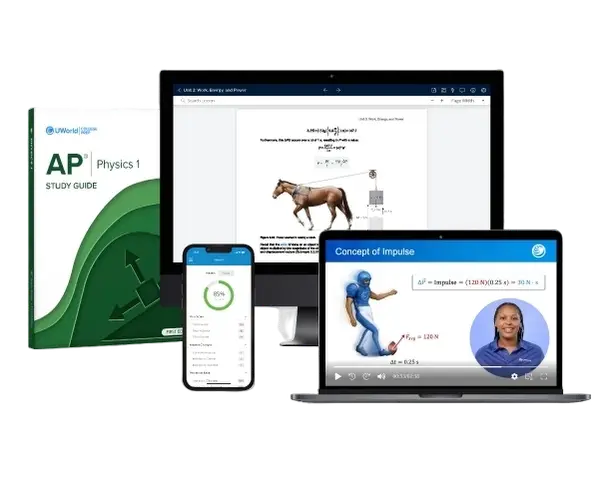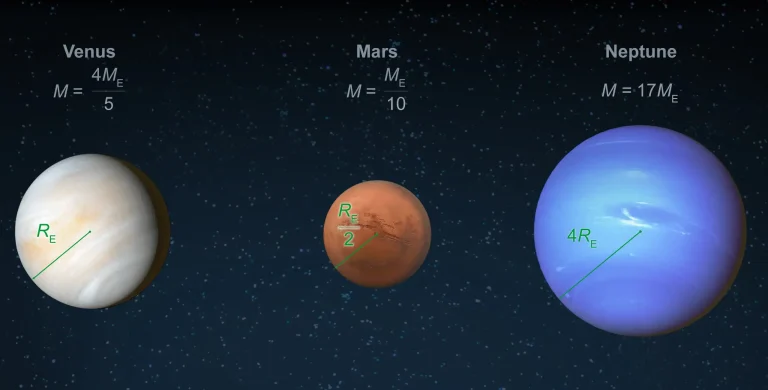College Board® offers 3 main AP® Physics courses. AP Physics 1 is designed to help you develop a solid grasp of fundamental physics principles. This course is equivalent to a first-semester introductory physics course in college. This article will examine how AP Physics 1 exam scores are calculated. We'll also share some statistical data on the distribution of AP Physics 1 scores.
How Is the AP Physics 1 Exam Scored?
The AP Physics 1 exam has 2 main sections. Section 1 includes multiple-choice questions (MCQs), while Section 2 has free-response questions (FRQs). Each section accounts for 50% of the total points you can score on the exam.
Here's a quick look at the exam format and the scoring method.
| Sections | Number of Questions | Score Weight | Grading |
|---|---|---|---|
| Section 1: Multiple-Choice Questions | 40 | 50% | Computer-graded |
| Section 2: Free-Response Questions | 4 | 50% | Graded manually by AP Readers |
In section 1, you will be given 40 questions with only 1 correct answer. These are the single-select multiple-choice questions. MCQs may appear as sets or individual questions, while the multiple-select MCQs will be discrete questions.
Section 2 of the AP Physics 1 exam has two 10-point, one 12-point, and one 8-point free-response questions.
Each AP Physics 1 exam section counts for 50% of the overall exam score. Here's how that works:
- The total number of points you scored in each section is calculated based on the number of questions you correctly answered.
- This raw score is then translated into a weighted, combined score using a predetermined conversion formula.
- This weighted combination score is correlated to the AP final score scale, resulting in an AP Physics 1 score of 1 to 5.
You will not be able to see your weighted combination score on the score report or the individual score for each section. You will only be able to see your final scaled score, which is between 1 and 5.
AP Physics 1 Scoring Table
Your AP Physics 1 exam score will range from 1 to 5. How well you do on the exam determines if you can get college credits or advanced placement. For a structured approach to mastering key concepts, check out our AP Physics 1 Study Guide.
College Board, which looks into these things carefully and updates their methods every year, came up with this 5-point scale. The main idea behind the AP Physics 1 course is to give high school students a taste of what college-level physics is like, with each score reflecting a possible college grade.
Let's look at the AP Physics 1 final score table and their relative college grade equivalents.
| AP Physics 1 Final Score | Equivalent College Grade |
|---|---|
| 5 | A+ or A |
| 4 | A-, B+, or B |
| 3 | B-, C+, or C |
| 2 | — |
| 1 | — |
Most colleges require students to earn a score of 3 or higher to qualify for credit or advanced placement. However, some colleges only accept a score of 4 or higher. Be sure to check with the colleges you want to apply to about their requirements.
For your convenience, the table below outlines how colleges typically determine eligibility for credit based on AP exam scores, according to the College Board's recommendations.
| AP Physics 1 Exam Score | Qualification |
|---|---|
| 5 | Extremely Well-Qualified |
| 4 | Very Well-Qualified |
| 3 | Qualified |
| 2 | Possibly Qualified |
| 1 | No Recommendation |
AP Physics 1 Score Distributions
Though AP Physics 1 is a stepping stone to AP Physics 2 or AP Physics C: Mechanics, it can earn you college credit for an introductory-level physics course. In 2025 alone, around 174,401 students took the AP Physics 1 exam. Of those, 117,372 students scored 3 or above.
Let's take a look at the AP Physics 1 score distribution for 2025:
| AP Physics 1 Score | No. of Students | % of Students |
|---|---|---|
| 5 | 34,531 | 19.8% |
| 4 | 43,076 | 24.7% |
| 3 | 39,938 | 22.9% |
| 2 | 23,370 | 13.4% |
| 1 | 33,486 | 19.2% |
While it's true that AP Physics 1 presents a unique challenge, this shouldn't deter you. In fact, it's an opportunity to shine. With the right support and resources, you have everything you need to excel in this course and on the exam. Enroll in our AP Physics 1 Course for expert guidance and effective study strategies.
| Final Score | % of Students in 2024 Exam | % of Students in 2023 Exam |
|---|---|---|
| 5 | 10.2% | 8.8% |
| 4 | 17.9% | 18.3% |
| 3 | 19.2% | 18.5% |
| 2 | 26.1% | 28.0% |
| 1 | 26.6% | 26.4% |

AP Physics 1 Minimum Score Requirement for College Credit
Colleges require a minimum score of 3 to qualify for credit and placement. However, each college has its own requirements, and some may request a higher AP Physics 1 score than others.
Solid preparation is key to maximizing your chances. Our AP Physics 1 practice tests provide in-depth practice with detailed explanations to help you master the concepts and boost your score.
So, it's always good to check in with the colleges you're applying to to see their requirements. Here's a list of some of the top colleges and their minimum AP Physics 1 score requirements.
| University | AP Physics 1 Score Requirement |
|---|---|
| Princeton University, Princeton, NJ | 5 |
| Brown University, Providence, RI | 3 |
| Arizona State University, Tempe, AZ | 4 |
| American University, Washington, DC | 4 |
| Berkeley City College, Berkeley, CA | 3 |
| Colorado State University, Fort Collins, CO | 3 |
Frequently Asked Questions (FAQs)
When do the AP Physics 1 exam scores come out?
The AP Physics 1 exam scores are released every year in July. You can check your scores online through your College Board account.
What is a good AP Physics 1 score?
Getting a final score between 3 and 5 is considered a good AP Physics 1 score. Scoring a 5 is the absolute best score.
Why are AP Physics 1 scores curved?
AP Physics 1 scores are curved for 2 main reasons:
- To maintain scoring consistency across the years.
- To correlate the final exam score to an equivalent college grade with accuracy and uniformity.
What score do I need to pass AP Physics 1?
You will need a score of 3 or higher to potentially be eligible for college credit.

Read More About the AP Physics Exam
Want to get a better sense of the AP Physics 1 exam? Here's a comprehensive article about AP Physics 1 that explains everything about the exam, prerequisites, and more!
Confused about the AP Physics 1 Exam Format? Visit our page for comprehensive AP Physics 1 format information, including exam structure and question types.
Getting into elite schools is not a hard task anymore. See what our experts say about scoring 5 on AP Physics 1 and all the resources you need to reach your target.
Best AP Physics 1 Study Guide Comparison
Kaplan vs. Barron's vs. Princeton Review vs. UWorld—compare strategies, features, and effectiveness to find the ultimate guide for AP Physics 1 success.
Best AP Physics 1 Review Course Comparison
Searching for top AP Physics 1 prep courses? Read this review to compare the best courses and choose the perfect one for your success.
How to Self-Study for AP Physics 1
Want to ace AP Physics 1 on your own? Follow this expert self-study guide with tips, tricks, and tools to prepare effectively for the exam.
References
- AP Score Reporting Services. apstudents.collegeboard.org. Retrieved from https://apstudents.collegeboard.org/score-reporting-services
- Past AP Physics 1 Score Distributions. reports.collegeboard.org. Retrieved from https://apstudents.collegeboard.org/about-ap-scores/score-distributions/ap-physics-1
- 2025 AP Exam Administration Scoring Guidelines. apcentral.collegeboard.org. Retrieved from https://apcentral.collegeboard.org/media/pdf/ap23-sg-physics-1.pdf
- AP Physics 1: Algebra-Based Exam. apcentral.collegeboard.org. Retrieved from https://apcentral.collegeboard.org/courses/ap-physics-1/exam
- AP Credit Policy Search. (2025). apstudents.collegeboard.org. Retrieved from https://apstudents.collegeboard.org/getting-credit-placement/search-policies/course/2




